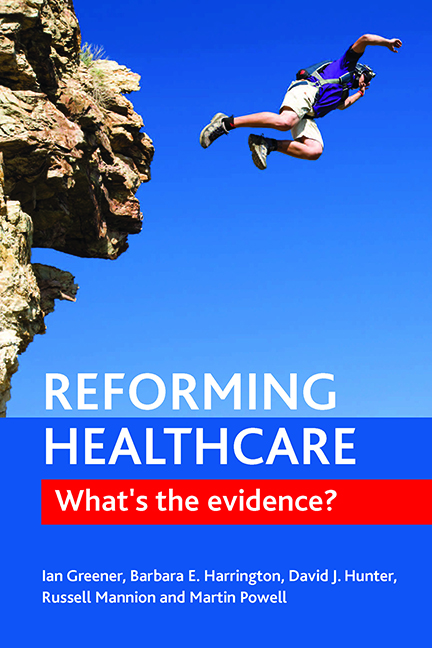Book contents
- Frontmatter
- Contents
- List of tables
- Acknowledgements
- one Introduction
- two The NHS in 1990
- three Reorganising the NHS, 1990–2010
- four ‘Central control’ reorganisation in the NHS in the 2000s
- five Local dynamic reform in the NHS since 2000
- six The prospects for NHS reorganisation post-2010
- seven Conclusion
- References
- Index
seven - Conclusion
Published online by Cambridge University Press: 25 February 2022
- Frontmatter
- Contents
- List of tables
- Acknowledgements
- one Introduction
- two The NHS in 1990
- three Reorganising the NHS, 1990–2010
- four ‘Central control’ reorganisation in the NHS in the 2000s
- five Local dynamic reform in the NHS since 2000
- six The prospects for NHS reorganisation post-2010
- seven Conclusion
- References
- Index
Summary
But rather than looking – again – for a structural answer that will work the same way everywhere right across the country, maybe it's time for more emergent models, more experimentation, and more diversity. (Stevens, 2011)
Introduction
In July 2013, the government withdrew its plans to put in place minimum unit alcohol pricing and plain tobacco packaging in England on the grounds that there was insufficient evidence to support these proposals, and despite Scotland already progressing such ideas. As such, three years after the general election of 2010, the government was still claiming that its approach to healthcare was evidence-based, albeit in the face of (in relation to these plans at least) considerable scepticism from the media and public.
This chapter considers what it means to be concerned about evidence and health reorganisation, and restates the book's central ideas and findings.
Evidence and policy
The ideal model of the link between evidence and policy has the former informing the latter, with policy then being carefully evaluated before creating new evidence on which new policy is based, in a virtuous circle stretching off into the future. But we know this doesn't happen. Policy-makers can come with their own ideas, evidence can be more equivocal or technical than policy-makers might like, and the best of intentions on both sides may be derailed by miscommunication and the urgency of problems of the day taking priority over a more careful, reflective approach. Health policy, be it at the local or national level, often appears to be as much about the influence and importance of particular individuals over the process as their mastery of research evidence (Oliver et al, 2012).
Equally, assuming that evidence-gathering and synthesis is a purely technical process that can produce unequivocal answers that are guaranteed to work is both to deny human agency and to raise the expectations of policy-makers and the public to a level that cannot possibly be met. Researchers have an obligation to be measured and cautious in their recommendations, as well as being aware of the limitations of their own work. Making recommendations for policy is too important to not contain caveats and make clear the need for contextualisations. If this frustrates policy-makers, who might want simple answers about ‘what works’, then perhaps the fault lies with those seeking simple answers to complex problems rather than with researchers attempting to better understand the world.
- Type
- Chapter
- Information
- Reforming HealthcareWhat's the Evidence?, pp. 147 - 154Publisher: Bristol University PressPrint publication year: 2014



